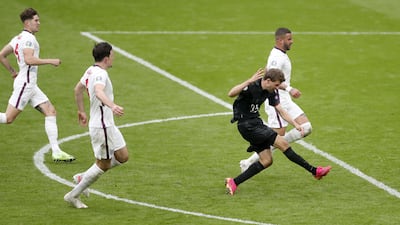Time froze when Thomas Muller advanced on goal. Thomas Muller, England’s nemesis in 2010. Thomas Muller, who can feel the personification of German football. And Germany are famously better than England. But then Muller, the man brought out of international exile for such moments, shot wide.
England did not just beat Germany. They did so with a clean sheet, their fourth in as many games. They had not started a tournament with four successive shutouts since 1966.
Four games into his European Championship career, Jordan Pickford already has more clean sheets than any English goalkeeper in the competition’s history. A player whose form for Everton has been shaky at times has flourished; Pickford made a brilliant save from Kai Havertz.
He is England’s 100 per cent man: six shots on target, six saves. With a scarcity of them, each shot has assumed a greater importance. None has been as significant as Muller’s off-target effort. What could have been 1-1 soon became 2-0. Germany, seared in English imaginations as their bogey men, were out instead.
But that low number, and only Italy have allowed fewer shots on target, reflects a conscious choice. Gareth Southgate decided to don a straitjacket. England have adopted an ascetic approach. It has been a defensive one. This has been a chastening tournament for many a goalkeeper and centre-back, but not the English ones.
“The gameplan worked brilliantly and we executed it really well,” said Harry Maguire, who produced arguably his finest performance for his country.
It is in part about defiance, but also about possession and taking the time out of games. Maguire has an 89.8 per cent pass completion rate at Euro 2020, John Stones a 95.4 per cent success rate. Like Pickford, the Manchester City defender has not always been a bastion of reliability, but they have given England solidity. Southgate has given them a strategy, based on concentration and organisation, on waiting for others to err while his team have not.
“We had to be patient,” he said. “We will always have passion and heart but we played with brains as well. We wanted to be man for man, the wing-backs did that and set the tone.”

His own change of system worked. The German wing-backs, Robin Gosens and Joshua Kimmich, had destroyed Portugal but England kept them altogether quieter. The decisive wing-back instead was Luke Shaw, who set up Raheem Sterling’s opener and played a part in Harry Kane’s goal.
Southgate’s side features a contingent of those, like Maguire, Kane and Sterling, who are firm favourites. But there are also others, like Shaw and the catalytic substitute Jack Grealish, who have had to win him over. He has studied the evidence and used them intelligently. Shaw was benched against Croatia, returned as a left-back but added more attacking thrust as a wing-back against Germany.
“We found a nice balance,” Southgate said. It is a recurring theme. He has been reluctant to unleash many of England’s attacking talents, and seven of Tuesday’s starters were essentially defensive-minded.
It makes him more cautious than a mentor was in Euro '96, but he said in March: “We have to strike that balance. I am always conscious of that. Terry Venables was very big on that. What’s the balance of attacking and defensive players?”
Perhaps it is still a little lopsided. England’s four games have produced fewer goals than the second half of France versus Switzerland did, but the World Cup winners are out. Its fourth-place team march on.
Not since the 1960s have England backed up a tournament semi-final appearance with a quarter-final in the next. Southgate has taken the hard-headed approach to making them regulars at the business end of tournaments. An immaculate defensive record has given them a platform for progress.











